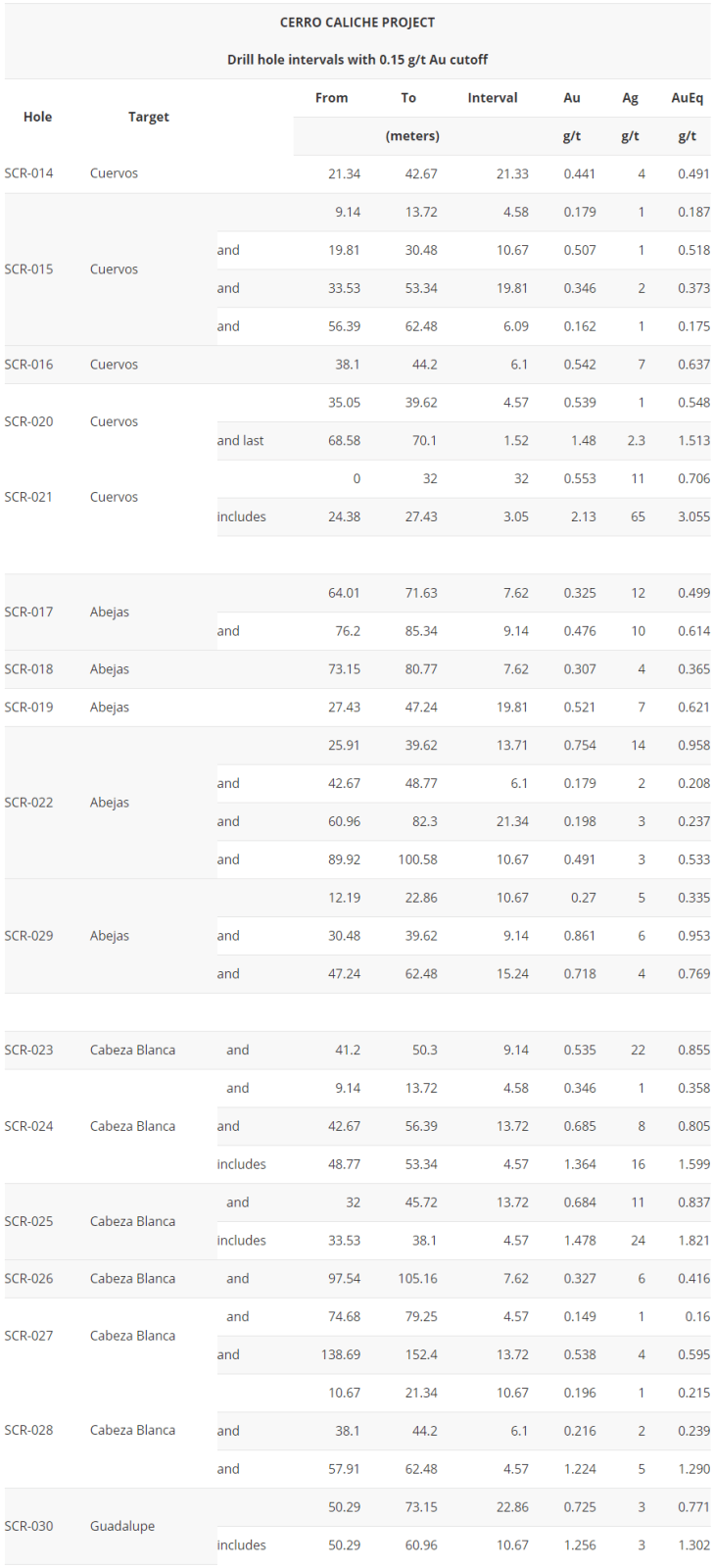VANCOUVER, Canada, December 5, 2018, Sonoro Metals Corp., (TSXV: SMO | OTCQB: SMOFF | FRA: 23SP), (“Sonoro” and the “Company”), is pleased to announce the second set of assay results, comprised of 17 drill holes, from the Company’s 10,000-meter drilling program at its Cerro Caliche gold project in Sonora, Mexico. With a total of 30 holes totaling approximately 3,000 meters drilled and assayed to date, Sonoro has defined portions of 7 distinct northwest-oriented structural trends hosting gold mineralized veins, surrounded by variable-frequency parallel sheeted veinlets and stockwork veinlets.
“The ongoing drilling program at Cerro Caliche continues to meet the primary objectives set out by Sonoro’s technical team prior to exploration,” said Kenneth MacLeod, President and CEO of Sonoro. “Drilling by earlier operators suggested the potential to develop a large-tonnage, heap leachable resource at Cerro Caliche suitable for open-pit mining. The current results support that proposition.”
The seven mineralized trends, named for the historic mine workings situated within each zone, are listed from east to west as follows; Las Abejas, Japoneses, Los Cuervos, El Quince, Cabeza Blanca, Guadalupe, and El Colorado. Distances between each zone range from 120 to 400 meters with widths reaching up to 60 meters and lengths of approximately 800 meters. However, the Japoneses and Cuervos zones appear to form one continuous structure extending approximately 1.2 kilometers. Mineralized intercepts from each zone are grouped in the table below. Widths are variable but generally 85% or more of intercept length:

Together with the drill results from the Japoneses zone announced in Sonoro’s news release dated November 9, 2018, the combined Japoneses and Cuervos zones demonstrate good continuity of gold mineralization over a continuous strike length of approximately 1,200 meters. Further extensions in both directions of this and other zones will be tested during 2019.
Approximately 500 metres of the Cabeza Blanca zone has been drilled, demonstrating gold mineralized intervals of up to 35 meters. Drill hole SCR-30, located 100 meters west of the Cabeza Blanca zone, is the first hole to test the Guadalupe zone, returning 22.86 meters of 0.725 grams gold per tonne. The two structures are projected to intersect at about 150 meters depth. Workings further north in the Guadalupe zone were recently mapped with several small grains of visible gold in quartz. Testing of this zone continues.
Several additional mineralized structures adjacent to the current exploration zones will be investigated over the coming months and results will be published as they become available. In addition, an area north of these zones, called the Rincon Plateau, consists of rhyolitic flows and flow domes in disconformable contact over older rock units. Sonoro plans to investigate the veins crossing the rhyolitic units for possible large zones of true disseminated gold mineralization.
Quality Assurance/Quality Control (“QA/QC”) Measures and Analytical Procedures
Drill samples are collected with an airstream cyclone, then passed into a splitter that quarters the large sample. The resulting quartered sample is bagged and sealed with identification. The sample group has blanks, standards and duplicates inserted into the sample stream. The samples are collected by ALS-Chemex and transported directly to the preparation laboratory in Hermosillo, Sonora.
The preparation laboratory reduces part of the sample to a pulverized quantity from which 500 grams is sent to the ALS-Chemex assay laboratory in Vancouver. Thirty grams are taken for fire assay for gold with the resulting button dissolved and gold determined with atomic absorption. Another quantity is dissolved in four acids for the ICP multi-element analyses.
After preparation, consisting of fine crushing, splitting and pulverization, the samples are then sent to Vancouver, BC for laboratory analyses by fire assay for gold with an AA finish. Another separate fraction is dissolved by four acid mix and multi-elements determined.
Geologic Description
The Cerro Caliche concessions are located about 45 kilometers southeast of Magdalena de Kino in north-central Sonora State. Historic mines within Cerro Caliche include Cabeza Blanca, Los Cuervos, Japoneses, Las Abejas, Boluditos, El Colorado and Espanola, which operated during various periods up to about 130 years ago.
Mineralization types of the Cucurpe Mega-district include variants of epithermal low sulfidation, epithermal mineralized dikes and associated volcanic rocks, and sub-adjacent mesothermal Carlin-type gold mineralization. These district deposits appear to be genetically similar with mineralization ages ranging from 40 to 30 Ma. Local altered felsic dikes cut the mineralized meta-sedimentary rock units and may be associated with mineralization in both the dikes and meta-sedimentary rocks. Cerro Caliche is a sub-district of the Cucurpe gold mine district with many gambusino workings, exploration pits and drill holes on the concession.
The Cucurpe Mega-district has generally been regarded as a vein dominated district including the operating Mercedes and Cerro Prieto mines. Activities at Cerro Prieto and Santa Gertrudis mine areas have developed open pit resources in recent years with more disseminated to stockwork style gold mineralization.
Host rocks include Jurassic-Cretaceous metasedimentary rock types including argillite, shale, quartzite, limestone, quartz pebble conglomerate and andesite. Intrusive rock consisting of medium coarse-grained granodiorite is present in the western parts of the project near the Cabeza Blanca mine. It is apparent that veining cuts the intrusive stock. The granodiorite also shows evidence of weak metamorphism, with chloritic alteration and irregular lineation textures. Rhyolite occurs in irregular bodies distributed in higher elevations in the northerly part of the concession, including the Rincon area, where it occurs as flows, sills, dikes and rhyolite domes. Part of the rhyolite is mineralized and appears to be related to epithermal gold mineralization throughout the project.
Stephen Kenwood, P. Geo., a director of Sonoro, is a Qualified Person within the context of National Instrument 43-101 and has read and approved this news release. Readers are cautioned that the presence of mineralization on properties adjacent to or in proximity to Cerro Caliche is not necessarily indicative of mineralization on Cerro Caliche.
About the Cucurpe Sonora Mega-district
The approximately 1,400 hectare Cerro Caliche concessions are held by Sonoro under option agreements with five vendors in this important gold mining district. The district includes Premier Gold’s Mercedes gold mine, Goldgroup Mining’s Cerro Prieto gold mine, Agnico Eagle’s Santa Gertrudis gold mine, and other gold mineralized prospect areas.
About Sonoro Metals Corp.
Sonoro Metals Corp. is an exploration and development company operating two precious metals projects in Sonora, Mexico. Sonoro’s skilled exploration team in Mexico is headed by Hermosillo-based geologist Melvin Herdrick, with 45 years of mine related experience, including 10 years as Chief Geologist for Phelps Dodge, Mexico and 7 years as Vice President, Exploration for Pediment Gold in Mexico until its takeover by Argonaut Gold in 2011. Sonoro’s Chief Geologist and Qualifying Person is Stephen Kenwood, with over 20 years of experience in mineral exploration and development.
On behalf of the Board of SONORO METALS CORP.
Per: “Kenneth MacLeod”
KENNETH MACLEOD
President & CEO
For further information, please contact:
Sonoro Metals Corp. – Corporate Communications:
Bill Campbell – Tel: (604) 565-5609
Email: info@sonorogold.com
Forward-Looking Statement Cautions:
This press release contains certain “forward-looking statements” within the meaning of Canadian securities legislation, including statements regarding the completion of a proposed Offering and the use of the Offering proceeds to further explore the Company’s Cerro Caliche project. Although the Company believes that such statements are reasonable, it can give no assurance that such expectations will prove to be correct. Forward-looking statements are statements that are not historical facts; they are generally, but not always, identified by the words “expects,” “plans,” “anticipates,” “believes,” “intends,” “estimates,” “projects,” “aims,” “potential,” “goal,” “objective,” “prospective,” and similar expressions, or that events or conditions “will,” “would,” “may,” “can,” “could” or “should” occur, or are those statements, which, by their nature, refer to future events. The Company cautions that forward-looking statements are based on the beliefs, estimates and opinions of the Company’s management on the date the statements are made and they involve a number of risks and uncertainties. Consequently, there can be no assurances that such statements will prove to be accurate and actual results and future events could differ materially from those anticipated in such statements. Except to the extent required by applicable securities laws and the policies of the TSX Venture Exchange, the Company undertakes no obligation to update these forward-looking statements if management’s beliefs, estimates or opinions, or other factors, should change. Factors that could cause future results to differ materially from those anticipated in these forward-looking statements include the inability of the Company to secure sufficient subscriptions to complete the Offering, the risk of accidents and other risks associated with mineral exploration operations, the risk that the Company will encounter unanticipated geological factors, or the possibility that the Company may not be able to secure permitting and other governmental clearances, necessary to carry out the Company’s exploration plans, and the risk of political uncertainties and regulatory or legal changes in the jurisdictions where the Company carries on its business that might interfere with the Company’s business and prospects. The reader is urged to refer to the Company’s reports, publicly available through the Canadian Securities Administrators’ System for Electronic Document Analysis and Retrieval (SEDAR) at www.sedar.com for a more complete discussion of such risk factors and their potential effects
THIS PRESS RELEASE DOES NOT CONSTITUTE AN OFFER TO SELL, OR THE SOLICITATION OF AN OFFER TO BUY, NOR SHALL THERE BE ANY SALE OF SECURITIES OF THE COMPANY IN ANY JURISDICTION IN WHICH SUCH OFFER, SOLICITATION OR SALE WOULD BE UNLAWFUL PRIOR TO REGISTRATION OR QUALIFICATION UNDER THE SECURITIES LAWS OF ANY SUCH JURISDICTION.
Neither the TSX Venture Exchange nor its Regulation Services Provider (as that term is defined in the policies of the TSX Venture Exchange) accept responsibility for the adequacy or accuracy of this release.
